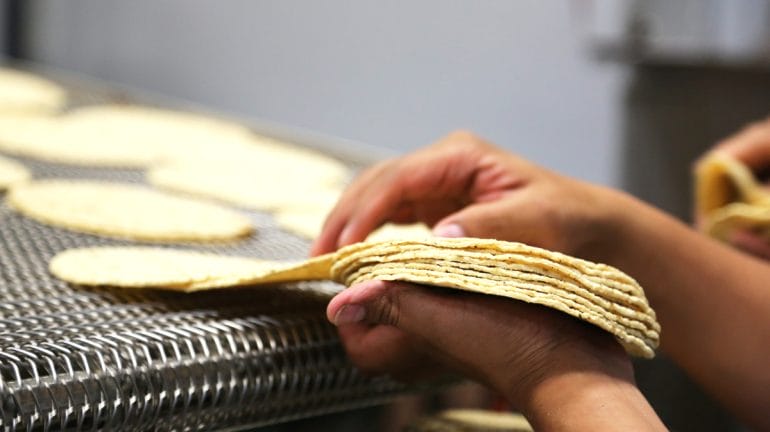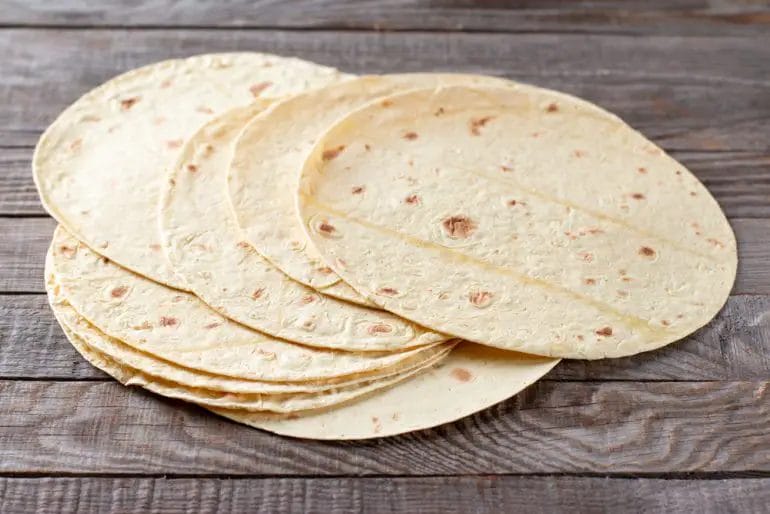In the world of culinary wonders, there’s one humble yet ubiquitous superstar that has captured the hearts and taste buds of people from all corners of the globe. It’s flat, it’s versatile, and it’s a staple on nearly every dining table.
Picture this: a warm, soft tortilla cradling succulent grilled meats, fresh vegetables, and a symphony of mouthwatering flavors. But here’s the twist – it’s not just reserved for lunch or dinner. No, this culinary marvel makes appearances at breakfast, brunch, and even dessert!
So, why are tortillas eaten at every meal? Join us on a tantalizing journey as we unravel the secrets behind this round wonder that has become an essential part of the world’s culinary tapestry. Buckle up, because the answer might just surprise you!

Why are tortillas eaten at every meal?
Tortillas are a staple food in many Latin American and Mexican cuisines. They are versatile, easy to make, and can be used as a base or accompaniment for various dishes. Tortillas are popular because they are filling, nutritious, and can be enjoyed with breakfast, lunch, or dinner.
Tortillas as a Staple Food: Cultural and Historical Significance
Tortillas are a type of thin, unleavened flatbread that has been a staple food in many cultures for centuries. They have a rich cultural and historical significance, representing the culinary traditions and heritage of various communities around the world.
The Origin of Tortillas
The exact origin of tortillas is uncertain, as they have been consumed by different cultures across different regions throughout history. However, it is believed that tortillas have their roots in Mesoamerica, specifically among the indigenous populations of Mexico and Central America.
The ancient Mayans and Aztecs were known to have used maize, a type of corn, as a primary ingredient in their diet. They developed a method of grinding maize into fine flour, which was then mixed with water to create a dough. This dough was flattened into thin rounds and cooked on a hot griddle, resulting in the creation of tortillas.
Tortillas in Mexican Cuisine
In Mexican cuisine, tortillas are not just a food item but a fundamental part of the culinary experience. They are used as a base for many traditional dishes, such as tacos, quesadillas, enchiladas, and burritos. Tortillas can be made from corn or wheat flour, each variety offering a unique flavor and texture.
Traditionally, corn tortillas were the most common type, as corn was abundant in Mesoamerica. Corn tortillas have a distinct flavor and a slightly chewy texture. On the other hand, wheat flour tortillas are softer and more pliable, making them popular for wrapping fillings.
Tortillas in Central and South American Cuisine
Tortillas are not limited to Mexican cuisine; they are also a staple in Central and South American countries. In countries like Guatemala, Honduras, El Salvador, and Nicaragua, corn tortillas are commonly consumed alongside various dishes, including tamales, pupusas, and empanadas.
In South American countries like Colombia and Venezuela, a similar type of unleavened flatbread called arepas is popular. Arepas are made from cornmeal, similar to corn tortillas, and are often filled with cheese, meat, or beans.
Tortillas in the United States
Tortillas have gained widespread popularity in the United States, particularly due to the influence of Mexican and Tex-Mex cuisine. They are not only used in traditional dishes but also in fusion cuisine, where they are filled with various ingredients to create unique and flavorful combinations.
In recent years, tortillas have become a go-to alternative for bread in sandwiches, wraps, and even as a pizza crust. Their versatility, mild flavor, and ability to hold fillings make them a preferred choice for many people looking for a lighter, gluten-free option.
Asia: Fusion Flavors
As Asian cuisines continue to blend with Western influences, tortillas are also making their way into fusion dishes.
In countries like Korea and Japan, Korean-Mexican and Japanese-Mexican fusion restaurants have gained popularity. These establishments often serve innovative dishes such as kimchi burritos or sushi burritos, which combine traditional Korean or Japanese flavors with the convenience of a tortilla wrap.
Tortillas hold a significant place in culinary traditions, representing the rich cultural heritage of various communities. Whether enjoyed in traditional Mexican dishes, Central and South American cuisine, or in creative fusion recipes, tortillas continue to be a beloved and versatile staple food for people around the world. That’s why you will see people enjoying tortillas not just for lunch or dinner, but in various meals throughout the day.

Nutritional Benefits of Tortillas: A Healthier Alternative to Bread and Other Carbohydrates
In recent years, tortillas have gained recognition for their nutritional benefits and have become a go-to option for those looking for a healthier alternative to bread and other carbohydrates.
1. Lower Calorie Content
One of the key advantages of tortillas is their lower calorie content compared to traditional bread. A regular-sized tortilla typically contains around 90-120 calories, while a slice of bread can range from 80-120 calories depending on the type.
This lower calorie content makes tortillas a great option for individuals who are watching their calorie intake or trying to maintain or lose weight.
2. Lower Fat Content
Tortillas also tend to have a lower fat content compared to bread. While the fat content can vary depending on the type of tortilla and preparation method, they generally contain less fat than bread. This can be beneficial for individuals looking to reduce their fat intake or follow a lower-fat diet.
3. Higher Fiber Content
One of the notable nutritional benefits of tortillas is their higher fiber content. Fiber is important for maintaining a healthy digestive system, promoting satiety, and regulating blood sugar levels.
Corn tortillas, in particular, are a good source of dietary fiber, with one tortilla containing around 2-3 grams of fiber. This can help individuals meet their daily fiber requirements and promote overall gut health.
4. Gluten-Free Option
For individuals with gluten sensitivities or celiac disease, tortillas made from corn can be a great gluten-free alternative. Corn tortillas are naturally gluten-free, making them a suitable option for those who need to avoid gluten in their diet.
They can replace bread in various dishes and allow individuals with gluten sensitivities to still enjoy their favorite foods without any adverse reactions.
5. Versatile and Nutrient-Dense
Tortillas can be filled with a variety of nutritious ingredients, making them a versatile and nutrient-dense food choice. Whether filled with lean proteins, vegetables, or healthy fats, tortillas can be customized to suit individual preferences and dietary needs.
They can be packed with vitamins, minerals, and antioxidants, depending on the ingredients used. Additionally, tortillas can provide energy from complex carbohydrates and help individuals feel satisfied after a meal.
In summary, tortillas offer several nutritional benefits that make them a healthier alternative to bread and other carbohydrates. With their lower calorie and fat content, higher fiber content, gluten-free options, and versatility, tortillas can be a nutritious addition to a well-balanced diet. Whether enjoyed as a wrap, taco, or a side dish, tortillas provide a delicious way to incorporate a variety of ingredients while still maintaining a healthier eating pattern.

Conclusion:
In conclusion, tortillas have become a ubiquitous staple in many cuisines around the world due to their versatility, taste, and convenience. Whether it’s breakfast, lunch, or dinner, tortillas are a go-to choice for many individuals.
Their ability to be filled with various ingredients makes them perfect for creating delicious and satisfying meals. From breakfast burritos to fajitas and quesadillas, tortillas offer endless possibilities for culinary creativity.
Moreover, tortillas are a cost-effective option that can be easily stored and transported, making them a practical choice for busy individuals and families. Their widespread consumption across cultures is a testament to their enduring appeal and adaptability.
So, the next time you enjoy a meal, consider embracing the versatility and convenience of tortillas, and savor the flavors they bring to every bite.
